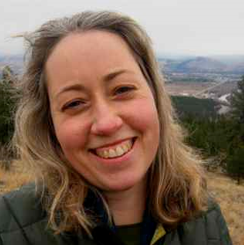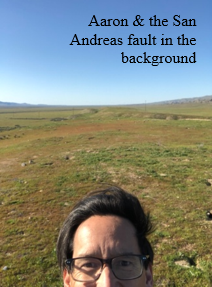Robinson Jeffers, Spirituality and the Universe
Fall to Winter, 2024
Greetings Members of the RJA,
Soon we will come to the arbitrary end of 2024. When the clock strikes midnight a certain change will be perceived, or hoped for, and we will move forward into the next year full of promise or fear; hope or desperation; new diets and exercise regimes; or, perhaps the chaos-invoking confusion of the relentless quest for growth, the divisive digital detritus of too much information, and the uncertainty of political and social change. I recall Jeffers’s verse, The day is a poem, “crusted with blood and barbaric omens/Painful to excess, inhuman as a hawk’s cry.”
An alternative, however, might be to acknowledge such a poem (day), observe its potential and dynamic charge, and then put it aside. Looking outward, we might be able “to kiss the earth again… let the leaves rain from the skies,” and “the rich life run to the roots again,” as Jeffers wrote in Return:
I will find my accounting where the alder leaf quivers
In the ocean wind over the river boulders.
I will touch things and things and no more thoughts,
That breed like mouthless May-flies darkening the sky,
The insect clouds that blind our passionate hawks
So that they cannot strike, hardly can fly.
Things are the hawk’s food and noble is the mountain, Oh noble
Pico Blanco, steep sea-wave of marble.
None of these things is arbitrary to our senses whether tactile or emotional; we sense them with deliberation and intention. To sense, rather than think, might be another way forward. In such times as the future will provide it is not denial to quiet thinking and focus on feeling. Instead, it is a way to stay in the present and absorb the magnificent: tall grasses swaying in the southwest wind; orange and yellow oak leaves in spiraling descent to the ground; gulls squawking as pelicans awkwardly reach for flight; or the universal hum of the distant boulevard in the deepest night, perceived on a sleepless night’s walk.
One of the elements of Robinson Jeffers’s poetry that is sometimes overlooked is his prevalent non-dual spirituality. By this I mean the simple sense of oneness with the universe. “…the rocks/ And the earth and the other planets, and the stars and galaxies… They make one being, one consciousness, one life, one God,” (CP v. 3, p. 432). This perspective shares in both pantheism (god is the universe), a theme that has been ascribed to Jeffers by scholars, as well as panentheism (the universe as a manifestation of God). I do not wish to enter the debate of how divinity might manifest in Jeffers’s verse. The poet has been sufficiently clear in his belief that the current universe is divine. I thus inquire about the hypothesis that humans are the sense organs of the universe, and therefore, of God, as Jeffers later states in the above quoted poem.
If this hypothesis is true, then our very bodily functions, our contradictory perceptions of politics or redemption, our feelings, fates and futile hopes are all divine. The consciousness that apparently only humans maintain (although even this is now being questioned) affords the luminous opportunity to witness and engage with divinity. (Yes, there is a problematic issue of ethics in this line of thinking; let us save that for another day.)
Scientific methodologies ask us to test our hypotheses and verify or refute. Lately I have been contemplating the lyrics of Robinson Jeffers as aphorisms. In my work as a geologist, I often share particular lyrics with friends and colleagues, and especially with students. I offer the poems not as “poetry” but as a cogent statement of observation or philosophy – an aphorism. This mechanism of introducing Jeffers to the uninitiated has a tangible effect of integration on the recipient. Analytical thinkers such as the scientists I too often interact with seem to be somewhat disarmed when they read “Hooded Night” or “Evening Ebb”. If you will permit me: These extended aphorisms quiet the thinking and open the sensing in even the hardened scientist or Gen Z student.
In other words, reading these extended aphorisms seems to take the uninitiated (to Jeffers) into a realm of sensing or even feeling, but not thinking, thus supporting the hypothesis that humans are, in fact, sense organs. If this is accepted, then it is not a far stretch to say that in observing and contemplating a speck of dust or the whole of the universe we are sensing the divine – whether one is inclined toward the analytical thought of divinity, or not.
What strikes me is the split-second response of temporary expansiveness that crosses the eyes of the reader if, and when they sense the austere beauty in a Jeffers verse. In its most profound expression, I am witnessing a person unsheathed from the human-created reality and engaged in a felt sense of the universal
To return to the arbitrarily change of the year at 12 AM, 1 January; well, I am indifferent. When I have the opportunity to watch another soul be challenged by a Jeffers verse, or observe the wind blow through the quaking limbs of a desert cottonwood, I know that the moment is a poem, and I have spent it well.
* * * * *
This is my last official correspondence with you all as President. Thank you for allowing me your time to read the electrons and ideas I spill on to the screen. Tim Hunt will take over in January. In fact, Tim has already been instrumental in the effort to move the RJA and Jeffers Studies into a reimagined, more widely engaging literary association and digital presence over the past few years as Executive Director. A number of new initiatives and publications soon will be unveiled that are tremendously exciting. The 100th anniversary edition of Roan Stallion, Tamar and other Poems will be published by Tor House Press. This will coincide with a new-look, on-line RJA conference focusing on the impact of 1925 on the legacy of Robinson Jeffers in terms of the Roan Stallion volume as well as the completion of Hawk Tower. Also, the open source, digital Jeffers Studies will be presented. Stay tuned!
2025 RJA Dues:
The notice to renew your RJA membership will be arriving in the coming weeks. Even better: protect that precious space in your inbox and renew now at: https://robinsonjeffersassociation.org/about-rja/join/
RJA Annual Business Meeting (Save the Date):
Our annual RJA Business Meeting will be in mid-February (on Zoom), and is tentatively scheduled for Saturday, February 22 at 1:00 PM Pacific/4:00 PM Eastern. Agenda items will include RJA setting programming priorities and amending the bylaws to formalize the role of the Jeffers Studies editor (how appointed, term of appointment, etc.)
Sincerely,
Aaron Yoshinobu
Out-going President, Robinson Jeffers Association

 stadium performances with a selection of poetry for the audience prior to the start of the concert, and Jeffers’ “Juan Higera Creek” was one of several chosen by the band (bottom right). It’s important to note that U2 are counted among the most successful bands of the late twentieth century and, like Jeffers, have graced the cover of Time magazine.
stadium performances with a selection of poetry for the audience prior to the start of the concert, and Jeffers’ “Juan Higera Creek” was one of several chosen by the band (bottom right). It’s important to note that U2 are counted among the most successful bands of the late twentieth century and, like Jeffers, have graced the cover of Time magazine.

 It is in our best interests to promulgate the lifestyle and poems of Robinson Jeffers, “ever so slightly”, to make sure that he remains relevant to the modern movements of artistry and to earnestly improve the world around us. What if each of us donated a copy of The Wild God of the World to a local high school or library or random, but possibly interested, stranger? What if we regularly posted images and poems of beauty in our social media? A lovely Instagram account “Poetry is Not a Luxury,” (@poetryisnotaluxury; right), a title that refers to Audre Lord’s seminal 1977 essay, has over 750,000 followers. The account simply posts a stanza or a whole poem every day, including the work of Rainer Maria Rilke, Jane Hirshfield, Emily Dickinson, and many others; a sure sign of the continued relevance of the role of poetry in sustaining our popular culture. How else might we imagine and innovate new ways to bring Robinson Jeffers to the forefront of the public dialog on art, politics, culture and science? Certainly, we may begin by saturating our local worlds with images, verses, and actions that are Jeffersian. Let’s follow on the example of rockstars and social media influencers as far as our powers may reach to demonstrate that this is the moment for America to become reacquainted with Robinson Jeffers.
It is in our best interests to promulgate the lifestyle and poems of Robinson Jeffers, “ever so slightly”, to make sure that he remains relevant to the modern movements of artistry and to earnestly improve the world around us. What if each of us donated a copy of The Wild God of the World to a local high school or library or random, but possibly interested, stranger? What if we regularly posted images and poems of beauty in our social media? A lovely Instagram account “Poetry is Not a Luxury,” (@poetryisnotaluxury; right), a title that refers to Audre Lord’s seminal 1977 essay, has over 750,000 followers. The account simply posts a stanza or a whole poem every day, including the work of Rainer Maria Rilke, Jane Hirshfield, Emily Dickinson, and many others; a sure sign of the continued relevance of the role of poetry in sustaining our popular culture. How else might we imagine and innovate new ways to bring Robinson Jeffers to the forefront of the public dialog on art, politics, culture and science? Certainly, we may begin by saturating our local worlds with images, verses, and actions that are Jeffersian. Let’s follow on the example of rockstars and social media influencers as far as our powers may reach to demonstrate that this is the moment for America to become reacquainted with Robinson Jeffers. We all are well acquainted with Jim’s erudite
We all are well acquainted with Jim’s erudite  In that vein, I would like to formally introduce Emeritus Professor Tim Hunt as our new executive director. If I need to introduce Tim to the RJA membership, then we may have a problem at the very core of our mission! After editing four volumes of
In that vein, I would like to formally introduce Emeritus Professor Tim Hunt as our new executive director. If I need to introduce Tim to the RJA membership, then we may have a problem at the very core of our mission! After editing four volumes of  The final addition to our leadership team is the election of new Advisory Board member, Louise Economides, who will join existing members Robert Zaller and Gere diZerega. Louise is a professor of literature at the University of Montana, where she focuses on the intersection of environmental studies and the humanities. Louise has written on “
The final addition to our leadership team is the election of new Advisory Board member, Louise Economides, who will join existing members Robert Zaller and Gere diZerega. Louise is a professor of literature at the University of Montana, where she focuses on the intersection of environmental studies and the humanities. Louise has written on “ “Civilization exists by geologic consent, subject to change without notice.” This quote, often attributed to Will Durant, contextualizes our modern condition and allows us to recognize the fragile connection between the environment and the culture—civilization—through which we interpret our existence. If we include the organic changes that arise from evolutionary biology in the broader context of Earth evolution, we might consider “biological consent” as equally subject to change without notice (read: viruses). Our existence has always been subconsciously predicated on the notion of earthly and biological stability. Yet here we are, amidst a global pandemic, the recent eruption of Hunga Tonga (right), and natural and anthropogenic climate change. We are faced with geologic phenomena that would find a fitting home in the poetry of
“Civilization exists by geologic consent, subject to change without notice.” This quote, often attributed to Will Durant, contextualizes our modern condition and allows us to recognize the fragile connection between the environment and the culture—civilization—through which we interpret our existence. If we include the organic changes that arise from evolutionary biology in the broader context of Earth evolution, we might consider “biological consent” as equally subject to change without notice (read: viruses). Our existence has always been subconsciously predicated on the notion of earthly and biological stability. Yet here we are, amidst a global pandemic, the recent eruption of Hunga Tonga (right), and natural and anthropogenic climate change. We are faced with geologic phenomena that would find a fitting home in the poetry of  I have no definitive answers for these questions, but there are many possibilities waiting to be explored. I look forward to working with all of you to increase and sustain the influence of
I have no definitive answers for these questions, but there are many possibilities waiting to be explored. I look forward to working with all of you to increase and sustain the influence of